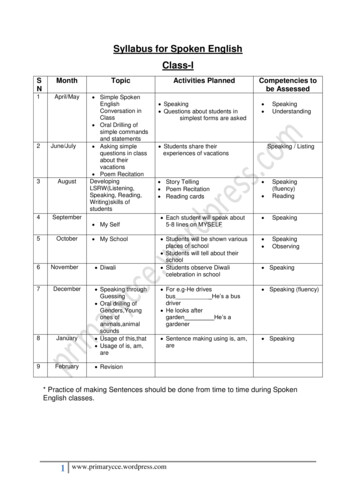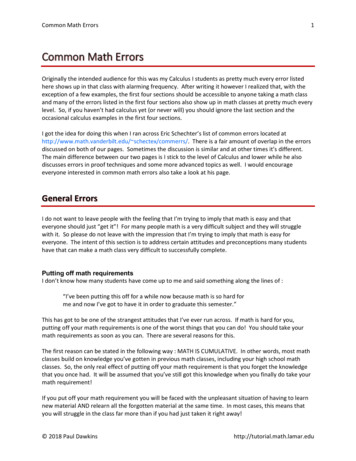
Transcription
About the TutorialEvery individual has the right to communicate as he pleases, however if the persondesires to express himself effectively and confidently, he should be aware ofcommon errors while speaking in the English language.The objective of this tutorial is to discuss a few tips and tricks that can help nonnative English speakers to spot some basic errors in speech, which wouldultimately benefit them in avoiding low grades, lost employment opportunities,and unproductive business.AudienceThis tutorial is designed primarily for young professionals who need assistance inspotting those common errors in English speech which might result in generalembarrassment while communicating in public.PrerequisitesBefore proceeding with this tutorial, you are expected to be in an open frame ofmind and ask the right questions and get their specific solutions on the topic.Disclaimer & Copyright Copyright 2015 by Tutorials Point (I) Pvt. Ltd.All the content and graphics published in this e-book are the property of TutorialsPoint (I) Pvt. Ltd. The user of this e-book is prohibited to reuse, retain, copy,distribute, or republish any contents or a part of contents of this e-book in anymanner without written consent of the publisher.We strive to update the contents of our website and tutorials as timely and asprecisely as possible, however, the contents may contain inaccuracies or errors.Tutorials Point (I) Pvt. Ltd. provides no guarantee regarding the accuracy,timeliness, or completeness of our website or its contents including this tutorial.If you discover any errors on our website or in this tutorial, please notify us atcontact@tutorialspoint.comi
Table of ContentsAbout the Tutorial . iAudience . iPrerequisites . iDisclaimer & Copyright . iTable of Contents . iiINTRODUCTION. 1English Grammar vs. Spoken English . 1A Brief History of Speech . 2HOW COMMUNICATION HELPS . 3English: The Language of Business . 3Accuracy Vs. Fluency . 3Why Spoken English? . 4IDENTIFYING LANGUAGE BARRIERS . 6What Stops Us? . 6Limitations of Grammar. 7FOUR RULES OF LEARNING . 8Speaking, Thinking, Practicing & Checking . 8TIPS TO CORRECTING ERRORS. 10Fossilization . 10The Art of Paraphrasing . 11ACTIVE LISTENING . 12Filter the Content Words . 12Beginner’s Jitters . 12ii
PRONUNCIATION OF VOWELS . 13The Connecting Sounds . 13Practicing Vowel Sounds- I. 13Practicing Vowel Sounds- II . 13COMMON ERRORS IN CONVERSATION . 15Stressing on Words in Speech . 15Tongue-twisters. 15Strategy to Avoid Errors While Speaking . 16READING EXERCISES. 17Content-Speech Disagreement - I . 17Content-Speech Disagreement - II . 17TYPES OF SPOKEN ENGLISH. 19Variations in Spoken English . 19QUICK TIPS . 22EXERCISES ON INCREASING EXPRESSION . 23Exercises on Increasing Expression . 23Tips to Remember . 23iii
INTRODUCTIONBefore we begin, let's be frank to ourselves- there is no magic formula that willwork for all who want to speak fluently in a non-native language, because everyperson has different levels of understanding and learning speeds curve. Just assome learn to play basketball better and quicker than others, different peoplelearn to speak a language depending on their individual learning aptitude.It is quite a demanding task to learn and speak a non-native language fluently.This tutorial is meant for those readers who learn English as their secondlanguage. It provides sufficient information on how non-native English speakerscan spot and rectify the errors they commit inadvertently while speaking inEnglish.English Grammar vs. Spoken EnglishA person stands to learn English quicker if he stresses more on the spoken side ofit, as compared to the grammatical side. Constant speaking and listening tocorrect usage will incorporate the right rules of grammar in his brain. This doesn'tmean that Grammar can be neglected.A conversation becomes more meaningful with the right usage of grammar, butas with anything new, stress should be more on practicing what you have learntmany times first, before moving on to something more complex. Similarly,beginners should stress on speaking what they have learnt first, before movingon to grammar and more technical stuff.1
A Brief History of SpeechIn the 20th century, a lot of people had a common opinion that individuals learnthe art of conversing during their childhood by observing people around them andimitating them.However, this theory was later discarded, as it couldn't explain the structural andgrammatical mistakes children did when they spoke specific sentences. Forexample, a child might say - "food give you me." in a family where no one wouldever say that line. This means that even at such a tender age, a child's mind startsprocessing and creating new rules in speech.While language competency is inherited, thetransmitted via learning.languages themselves are2
HOW COMMUNICATION HELPSEffective communication helps individuals as well as business organizations to bemore productive, to generate innovative ideas, and to build strong relationshipswithin internal and external teams.English: The Language of BusinessThere was a time when speaking English accurately and fluently was considered astatus symbol, but now English has become a necessity, as it is a universallanguage with around 45% of global business being conducted in English. Todaydue to globalization, all the multinational companies either recruit or prefer torecruit aspirants who communicate fluently and correctly in English.Remember that spoken English is supposed to help you in conversing with people.The listeners are more important than the speakers. It's not what you say,but how you say it.Accuracy Vs. FluencySpeaking fluently in English is a major goal for many non-native speakers.However, to communicate your ideas effectively, you will need both accuracy aswell as fluency.In majority of cases, people are either good at accuracy or good at fluency. Thefollowing cases depict the same3
An English language perfectionist might pause frequently to correct himselfwhen he makes accidental errors in grammar, pronunciation and structure.However, in the long run, it will disengage the listeners from theconversation. On the other hand, a fluent person who does not bother much aboutgrammatical accuracy might realize soon enough that the listeners arefinding it difficult to understand what you really mean.So, how can you make sure to balance a mix of both is the question. The idealway is definitely to speak accurately and fluently, but that will come after years ofpractice. The important point is to strike a balance between the two.Why Spoken English?Speaking in English plays a vital role in advancing your professional career togreater heights. It plays an equally important role during one’s academic careeras well. Here in this chapter, we will explain the significance of English in achievingcareer progression and personal development.Let’s see how good communication skills can become your asset: For Business Executives – Effective communication helps businessexecutives in dealing effectively with co-workers, superiors, clients, andexternal vendors. For Students – Students having a good command over spoken Englishexpress their feelings better. They communicate well with classmates,4
friends, instructors, and parents which enables them to reduce a lot ofstress and pressure.Lack of effective communication skills is more often than not the primary reasonwhy people tend to hate their jobs. With a little bit of improvement incommunication skills, especially spoken English, they can realize their truepotential and in the long-run would love the same job they used to hate so much!With the globalization of business, almost all the major companies have startedlooking for employees who can communicate better in English. This is nowbecoming a standard communication channel in the business world.With this, speaking in English has become a mandatory requirement in the fieldsof Information Technology, call centers, BPOs, to name a few.rJohn F. Kenned-5
IDENTIFYING LANGUAGE BARRIERSNon-native speakers find it difficult to speak just what they really want; sometimesthey even struggle to obtain basic information concerning products or serviceswhile communicating.Teachers frequently complain about non-native speakers' lack of critical thinking.Sometimes they feel that students are lost or confused but the problem lies in thestudent’s ability (or rather inability) to communicate effectively.What Stops Us?Different speakers have different motives behind learning English - some learn itto clear their examination papers, while some to get job offers, and there aresome who learn English simply because they love the language.It's still debatable if motivation yields success or it's the other way round, butEnglish can only be learnt out of the love to be able to hold a meaningfulconversation in it.6
Limitations of GrammarPeople interested in improving their Spoken English need to understand thatlearning the rules and usages of English Grammar does not improve their chancesof speaking the language, but confuses them and discourages their speaking.Spoken English can be only enhanced by repeated listening to correct usage,constantly speaking the language with audiences with different levels of aptitudesin speech, and learning grammar rules and usages simultaneously.7
FOUR RULES OF LEARNINGRules are important because they set the guidelines to what is acceptable andwhat is not. Here, in this chapter, we will discuss the four rules of learning.Speaking, Thinking, Practicing & CheckingMany suggest that continuous practice is the key to fluent Spoken English,however, studies have found that only practicing doesn't necessarily guaranteeresults.The best way to learn how to speak in English is listening to large volumes of audioinput, learning its grammatical structure and vocabulary, and then using theknowledge you have gained on a target audience.Speak the language aloudTraditional Spoken English training methods take a very long time to yield results,if at all, because the stress is more on reading and writing, however, speaking alanguage needs a lot of interaction with a target audience who can provide directfeedback and also suggest improvements to your speech.Think in the target languageMost of us have a faulty technique of thinking about a sentence in our nativelanguage and then translating it in our head into English before finally speaking itout. You need to remember that speaking, in itself, is an extremely tricky andcomplex exercise involving a huge part of our brain, throat and tongue musclesand wind flow. Adding mental translation to the already complex task leads toerrors like abrupt pauses and fillers in speaking. Thinking in the target languageis a major decision which has to be taken by the individualSpeak in the language whenever possibleAny language comes with its own set of sounds, phonetics, wind flow that makespronunciation of words and sounds in that language very different from the waywe speak in our native language. To master these variations in sounds and speech,one needs immense practice of the correctly pronounced sounds.Never repeat this mistakeThere's a misconception that while speaking English, a person should beencouraged to just speak in the language, without any stress on properpronunciation or grammar sense. This, in reality, adversely affects a person's8
learning as speaking incorrect English is actually forming a bad habit of incorrectEnglish. The right way is to train the speakers on basic grammar skills and guidethem to create simple sentences using appropriate grammar.9
TIPS TO CORRECTING ERRORSFossilizationA person who is interested in just putting his message across may not becompletely aware of correct usage of grammar, as his primary objective is only toconvey his/her message across by using any means of communication availableto them, which include signaling, paraphrasing, signaling and directing. In thisway, over a period of time, these people learn a self-adapted method of speaking.They learn that their errors in subject-verb agreement (e.g.- 'she' instead of'her', 'us' instead of 'we') are not affecting their transfer of the message to theirlisteners, so they start to subconsciously ignore certain rules of grammar evenwhen they are introduced to it, trained in it and asked to communicate with it.This phenomenon is called “fossilization”, where a speaker continues to makethe same mistakes over and over again, even if he knows the correct usage, simplybecause he is encouraged by the fact that his message is getting understoodwithout him not having to abide by the rules of grammar.Speakers like these need to be nurtured in an environment where their targetaudience encourages them to talk in simple and accurate English, and ask them10
to repeat themselves when they make such mistakes. This will eventuallyhelp these speakers internalize the correct usage, as opposed to storing all theusages for a short period of time and then forgetting them as soon as the testingscenario- like examination, evaluation, presentation- changes.The Art of ParaphrasingDespite having a wide vocabulary enables you to speak fluently and accurately inEnglish, not knowing the right word for something you want to mention shouldn'tdent your confidence too. A lot of people feel insecure about speaking in Englishfor the fear of not being able to find the right words. In cases like these, theyshould revert to a very effective technique called "paraphrasing"Paraphrasing is a technique of using an alternative word or sentence to describesomething you wanted to say, for example, instead of saying 'rhinoceros', youcould say- "you know? That animal with a horn on its head?", or instead ofresume', you could say- 'that document you are supposed to give to the HR'When you speak to someone, it’s a two way communication. Both are equallyimportant to be a part of the conversation. If your listeners lose interest while youwait for the right word, the conversation might get over very quickly. Paraphrasingwill allow you to continue your speaking while involving the listeners by askingthem to help you out with the right word(s).Speaker- "I went to. what do you call it? The place where they keep animals?"Listener- Yes, yes. a zoo. You went to the zoo? Wow!See? The listener feels he has a part in helping you speak and in return,will value the conversation much more.11
ACTIVE LISTENINGFilter the Content WordsThe traditional approach of learning grammar has always been to help youunderstand what others are saying and at what time they talk.A lot of people get confused with the excessive intake of information while talkingto a native speaker. They complain that the native speakers speak the languagetoo fast, even when the native speakers are speaking with a perfectly normal rateof speech. This is due to the fact that your brain is taking in way too muchinformation (grammar, intonation, meaning, usage, pronunciation) thanyour brain can process at one time.The idea is to listen carefully for 'content words’ that help us in getting a verybasic idea of what the person is talking about. Listen carefully to the entiresentence, picking only those familiar words that you could comprehend, and filterout the rest of the words. Now you have lesser and familiar words to understandthe meaning of. Try to arrange the words in a sentence and start paraphrasing.Beginner’s JittersIf you have understood what the speaker was saying, he would respond with a'yes', or else he would reply back with a much easier version of his originalsentence. By doing this you have given him a clear idea of how much of his formersentence you have grasped the meaning of, so that the next sentence he speakswill be directed towards explaining the rest of the information in a simpler way.Similarly, don't get upset or disappointed when you can't apply all the correct rulesof Grammar in spontaneous speech. It's perfectly normal for a beginner tobecome nervous when you are trying to be fluent and accurate in a non-nativelanguage, but the key lies in enjoying the conversation without paying a lot ofstress on correctness in the beginning.12
PRONUNCIATION OF VOWELSThe Connecting SoundsVowels help us in distinguishing one word from another. Needless to say, whenyou are not fluent with the vowel sounds, your speech sounds confusing andvague.There are no straightforward answers to the question of which language has morevowels, since that entirely depends on how they are counted. However, in thefollowing activity, we have tried to list the most common variations on vowels inEnglish. You are requested to read the words aloud to understand the differencein pronunciation vowels bring in words with almost identical spellings.Practicing Vowel Sounds- I[I:] As In TREE: Equal – Even – Evening – Evil – Recent – Region Sea – Tea – Team – Cream – Clean – Lead – Read[I] As In NEAR Fear – Hear – Ear – Near – Clear – Rear[I] As In BIT Hit – Him – His – Is – It – Fit – Did Cabin – Habit – Unit – Justice – Public[E] As In BED Red – Bed – Bet – Let – Met – Set – Sell Embrace – Employ – Engage – Enjoy – Enlarge[E] As In FARE Care – Dare – Bare – Rare – Share – Spare – Scare Fair – Hair – Air – Affair – Pair – Repair – DespairPracticing Vowel Sounds- II[Æ] As In BAT Land – Hand – Sand – Stand – Command – Demand Dance – Chance – Glance – Fancy – Answer – Dancer13
[A:] As In TAR Car – Card – Hard – Are – Far – Bar – Garden Mirage – Garage – Massage – Facade – Ensemble[O:] As In SHORE Core – More – Bore – Before – Shore – Sore – Store Boring – Story – Sorry – Borrow – Sorrow – Tomorrow[O] As In HOT Hot – Lot – Not – Got – Forgot – Forgotten – Bottle College – Dollar – Tom – Bomb – Comment – Compliment[U:] As In RULER Rude – Rule – Rumor – Brutal – Lucy – June – Junior Food – Cool – School – Fool – Foolish – Pool – Tool[U:] Or [U] Room – Broom – Roof – Root – Soot – Hoof – Coop – Boulevard[Yu:] As In USER Use – Useful – Union – Unit – Unite – Unique – University Fuse – Refuse – Future – Cute – Cube – Huge – Humor – Human[U:] Or [Yu:] As In TUMOR Tune – Tulip – Tumor – Student – Studio – Stupid New – Newspaper – Nude – Nuclear – Numeral – Nutrition[U] As In BOOK Book – Cook – Hook – Look – Shook – Took – Good – Hood Put – Push – Pull – Full – Bull – Bullet – Bush – Butcher[Ər] As In SIR Her – Herb – Verb – Serve – Perfect – Person – Certain Mister – Cover – Buyer – Better – Teacher – Finger[Ə] As In BUT But – Nut – Fun – Sun – Dull – Lucky – Ugly – Suddenly Correct – Collect – Contain – Memory – History – Freedom14
COMMON ERRORS IN CONVERSATIONA huge number of non-native English speakers make frequent English slip-upsduring conversations. Instead, they are supposed to have awareness of wheretheir weak spots are during the initial period of learning. By this, they can be closeto understanding themselves and how they can progress from that point.Stressing on Words in SpeechMany non-native speakers tend to forget that reading a text doesn’t explainintonation in speech. In English, it is possible to put the main stress on (more orless) any word in a sentence. For instance, the speaker can stress on reflectingthe meaning they intend the listeners to understand.Example Here is your Indian friend. ( the friend is standing near the speaker)Here is your Indian friend. ( the friend has not left yet)Here is your Indian friend. ( he is your friend; not his nor mine)Here is your Indian friend. ( not French)Here is your Indian friend. ( not enemy)Many errors in speech would be corrected if the right words were properlypronounced at the right time. The following activity is designed to slow down yourrate of speech so that you can focus on pronunciation and clarity.Tongue-twistersRead out the following sentences as loud as you possibly can: She sells sea-shells on the sea-shore.The shells she sells are sea-shells, I'm sure.For if she sells sea-shells on the sea-shoreThen I'm sure she sells sea-shore shells. Peter Piper picked a peck of pickled peppers.A peck of pickled peppers Peter Piper picked.If Peter Piper picked a peck of pickled peppers,Where's the peck of pickled peppers Peter Piper picked? Shep Schwab shopped at Scott’s Schnapps shopOne shot of Scott’s Schnapps stopped Schwab’s watch15
Strategy to Avoid Errors While SpeakingYou can record sample pieces of your speech and play them to find out the areaswhere you can improve further. It will help you in reviewing and understandingyour strengths and weaknesses better.Secondly, ask your friends to give constructive feedback and suggest areas ofimprovement. It helps in getting more insights and uncover more details whichwere missed by you.Play the recorded audio several times and try to rectify the errors until you havemastered the technique. It is a time-tested strategy used even by experiencedspeakers.16
READING EXERCISESContent-Speech Disagreement - IPlease read the following paragraph in your mind first:"There was a time when the Software Industry was just warming up, andthe government needed to allot space to the multinational companies,who aggressively lobbied for larger territories to expand their officepremise."Note that, it was very easy to go through the entire paragraph without any issues.However, I’m sure many of you could have speed-read through it.Content-Speech Disagreement - IINow, let's try reading the same paragraph as you would read something aloud,but only by moving your lips and not uttering any sound:"There was a time when the Software Industry was just warming up, andthe government needed to allot space to the multinational companies,who aggressively lobbied for larger territories to expand their officepremise."Did you notice any difference in the way your brain functions in both thecases?Human brain is trained to accept running text as just information, hence the levelof mental exercise is minimum. However, when we try reading it aloud, differentfactors which are listed below will start coming to our mind which increases brainactivity PronunciationSpeechBreathWind manipulation17
This is the reason why many experts state the traditional method of book-readingas a complete waste of time, unless it includes exercises where people areencouraged to read from text and speak it aloud, at times at top volumes.18
TYPES OF SPOKEN ENGLISHSlangs consist of a vocabulary of non-standard words and phrases in a givenlanguage. Its use implies that the user is familiar with whatever is referred to, orwith a group of people who are familiar with it and use the term.Variations in Spoken EnglishDifferent people will need different levels of accuracy and fluency in SpokenEnglish, depending on the professions they are in. Let’s discuss the different levelshere:Professional Spoken EnglishThis type of language is used by professionals from specific industries. Thespeech used here is highly technical, with stress put on facts, figures, data andindustry jargons.ExampleMary: "How is your day going?"John: "Very busy. I'm preparing a detailed presentation onmarketing strategy and competitor analysis which would bepresented to the client. I'm not even half done yet."Mary: "You must feel anxious out now."John: "Of course, that’s an understatement."Literary Spoken EnglishThis is the language used in magazines and newspapers. The stress is more oncommunicating with a large section of the crowd. The speech follows all rules ofgrammar and yet, the words used are simple and common.ExampleClive Staples Lewis, commonly known as C. S. Lewis (29 November1898 – 22 November 1963), was a novelist, poet, academic,medievalist, literary critic, essayist, lay theologian, broadcaster,lecturer, and Christian apologist. Born in Belfast, Ireland, he heldacademic positions at both Oxford University (Magdalen College),1925–54, and Cambridge University (Magdalene College), 1954–63. He is best known for his fictional work, especially The Screwtape Letters, The Chronicles of Narnia, and The Space Trilogy, and19
for his non-fiction Christian apologetics, such as Mere Christianity,Miracles, and The Problem of Pain.Conversational Spoken EnglishThis English is the more widely used in daily conversation, where rules of grammarare more relaxed, stress is more on just getting the message across. Sentencesmight be dropped half-way on realizing that the listener has gotten the message.ExampleSituation: The conversation is between an employee who workswith an interior designing store and a client.Receptionist: “Good Afternoon. This is EFX Interior Designer Store.How may I help you today?”Mohan: “Hi. I am Mohan. I wanted to get a custom-made interiordecoration done for my house. Could I please speak to someone?”Receptionist: “Sure Sir. Just hold on for a second or two.”Mohan: “Okay. Sure.”After a while Raj: “Hey. This is Raj. How can I assist you?”Mohan: “Hi Raj, I’ve heard a lot about your Interior designingcompany. Could you provide me some samples of your work? I amlooking for a trendy and aesthetically looking interiors for my newlybuilt house.Raj: “Well, Mohan. You’ve approached the right place. I will be morethan glad to help. Though you will have to provide some more detailsthat you are looking at.”Mohan: “Raj, I am actually looking for a colourful theme for eachroom along with some lighting variations on the ceiling”Raj: “Sounds interesting! Any colour in particular?”Mohan: “Yes, actually. I am hovering over two colours. One bei
Spoken English can be only enhanced by repeated listening to correct usage, constantly speaking the language with audiences with different levels of aptitudes in speech, and learning grammar rules and usages simultaneously. 8 Rules are important










